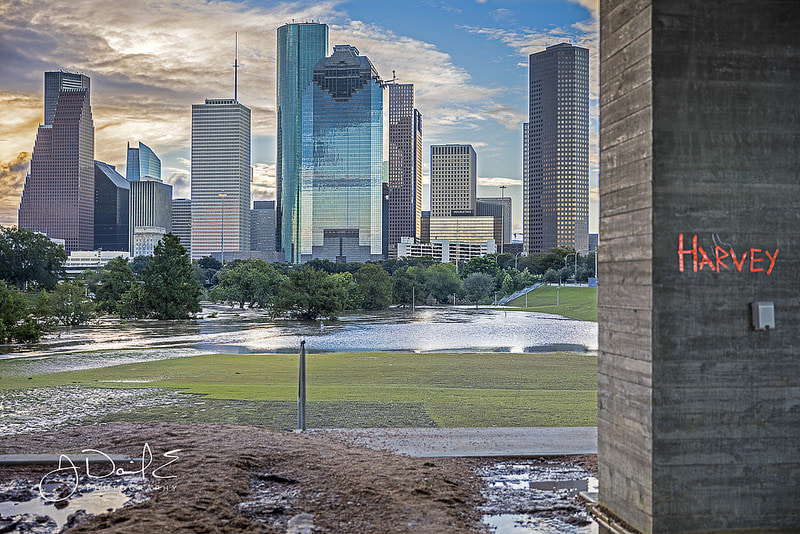|
Nearly a decade ago, before his notorious interruption of Taylor Swift’s VMA acceptance speech, Kanye West lit news media on fire when he made the proclamation, “George Bush doesn’t care about Black people” in relation to the aftermath of Hurricane Katrina. Mike Myers’ reaction and the gratuitous memes that followed aside, Kanye was making the point in less than diplomatic words that climate change and natural disasters, like Hurricane Katrina, or the most recent Hurricane Harvey in Texas, disproportionately affect poor people and communities of color. Before, during and after a storm, racial and economic disparities make experiencing climate change and natural disasters more difficult for people on the marginalized end of the spectrum.
In the days and hours approaching a storm, people do what they can to prepare. Preparation takes many forms – stockpiling necessities, protecting properties and assets, and in dangerous enough situations, evacuating. The CDC suggests you make a disaster-preparedness kit before a disaster strikes, but for people who live on subsistence wages, securing three days’ worth of food or additional prescriptions can be completely unaffordable. This is particularly true when, despite its illegality, merchants choose to inflate the prices of necessary goods in an exponential fashion. For poor neighborhoods that already experience a relative lack of consumer choice, this can be doubly debilitating. Food and water are not the only necessities susceptible to price gouging. Those who wish to protect their homes are often stuck paying more for things like plywood or generators. Unlike grocery cabinets or medicine in America, you can take out affordable insurance policies for the damage you can’t protect against, so problem solved, right? Sort of. Payouts for claims can be reduced significantly if homeowners don’t shutter their windows and doors. Most homeowner’s insurance policies cover hurricane damage, but not flood damage, and It’s suggested that 80% of people, despite living in a flood-prone area, do not carry a flooding policy. For millennials laughing at the suggestion of owning property: A 2014 survey suggests that a majority of young adult renters do not carry a renter’s insurance policy – meaning, even if their landlord carries flood insurance, a tenant who loses all of their possessions to a flood on the ground floor would be liable to replace everything. Additionally, auto insurance companies will not cover hurricane damage without a comprehensive insurance policy. Many insurance companies go into a sales freeze for customers in the path of an announced hurricane meaning the only way to save your car might be to escape with it. Evacuating can become a luxury in a disaster situation. While the physical infrastructure of our roads make it difficult for everyone to leave, trying to get out of town on public transportation can spell trouble for people who depend on it for affordability or accessibility. In the wake of Katrina, public transportation systems and railroads shut down before people could leave the city. Those who wound up in the Superdome fiasco were likely there from a lack of alternative options. Unfortunately, due in part to a lack of preparation and the erratic nature of natural disasters, Houston did not have an evacuation plan. “The people most likely to be found dead are the elderly, the infirm and the people who were isolated from others — along with folks who didn't have the means or wherewithal to flee”. At the end of the storm there is a lot to deal with, but recovery from the storm favored those with money in hand. People living on subsistence wages haven’t been working for however long they’ve been displaced, ineffective emergency management allowed for people to receive paltry settlements for their damaged or destroyed property, and entire neighborhood support systems have been dissolved and spread across the United States. In the wake of Hurricane Katrina, rental units saw an average increase on prices by 40%, and people weren’t able to come back to the same public housing they left. Public housing as it existed before Katrina was razed and replaced with fewer units and the value of private property skyrocketed. For some, coming back to New Orleans was nearly impossible. Eight years after the storm had passed, the percentage of Black People representing New Orleans’ constituency decreased from 66% to 59% What does that mean for Houston? It’s not looking good. “In Houston 30 percent of residents live below the poverty line. And like New Orleans and indeed most other urban centers in the US, poverty in Houston is overwhelmingly and disproportionately racialized”. There are already reports of tenants being evicted from their rental housing. While I’m sure Kanye won’t be doing any soliciting for donations this time around, we don’t really need him to tell us what Donald Trump thinks of racial minorities. Along with an outright dismissal of environmental and disaster mitigation specialists, there was no director for the Federal Emergency Management Agency until the early part of June – three weeks into hurricane season. If you are interested in assisting with aid efforts, donate to agencies that speak to your values and assure they are using your donation to provide services and not pay for overhead. Check out the Charity Navigator for further information. If you would like to learn more about your rights or believe that you have been discriminated against please visit the Civil Rights Justice Center located at 2150 N. 107th Street in Seattle Washington or visit our website at civilrightsjusticecenter.com
1 Comment
|


